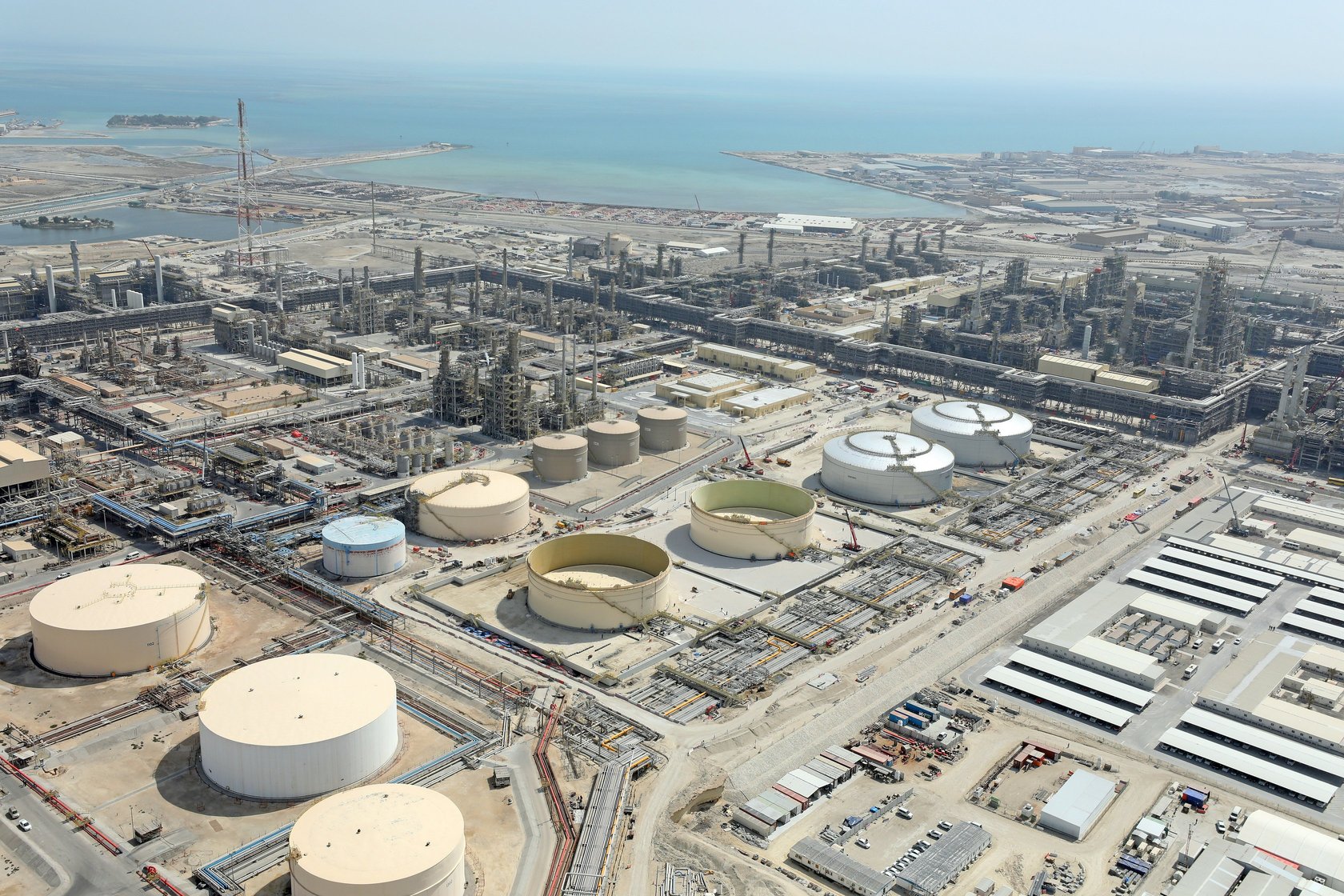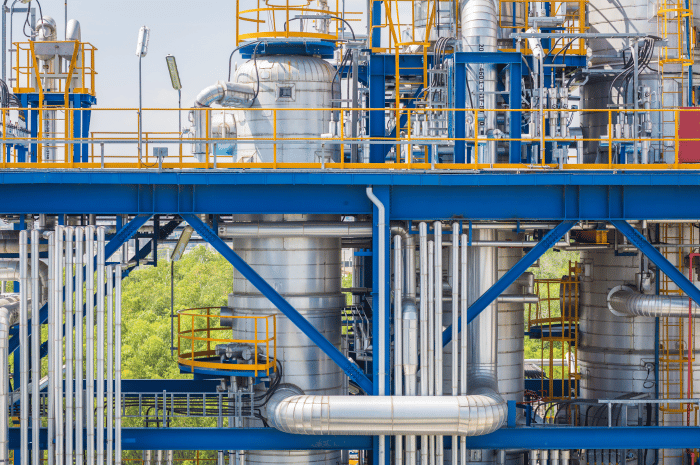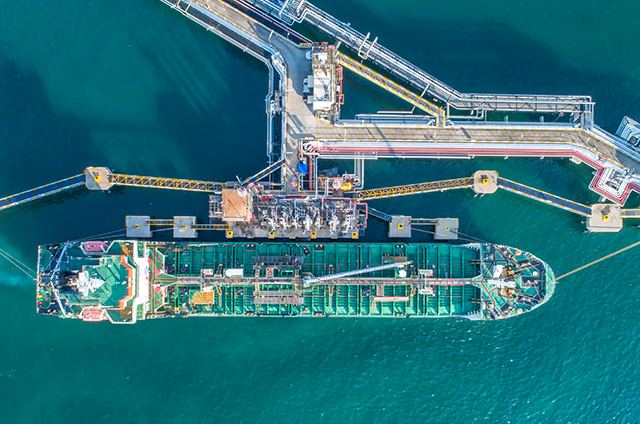
Sitra Refinery | Bapco Modernization Program Page
Historical Development
The Sitra Refinery holds the distinction of being the first refinery constructed in the Arabian Gulf outside of Iran. Key historical milestones include:
- 1936: Original construction with 10,000 bpd capacity
- 1945: Opening of the Arabia-Bahrain (AB) pipeline for Saudi crude supply
- 1968: Major expansion increasing capacity to 250,000 bpd
- 1997: Full ownership transfer to the Government of Bahrain
The refinery has undergone continuous upgrades to maintain competitiveness:
- 2005: $1.1 billion modernization program initiation
- 2007: Ultra-low sulfur diesel complex development
- 2011: $430 million lube base oil plant inauguration
- 2013: $120 million wastewater treatment plant and $108 million steam turbo-generators installation
Processing Capacity and Configuration
Pre-BMP (BABCO Modernization Program) until end of 2025
Pipeline Upgrade (AB4 Pipeline)
- Total Length: 115 kilometers
- Initial Capacity: 350,000 bpd
- Design Capacity: 400,000 bpd
- Route: Abqaiq (Saudi Arabia) to Sitra Refinery
- Sections: 43 km onshore Saudi Arabia, 41 km subsea, 31 km onshore
- Bahrain Investment: $350 million
- Completion: 2018
Processing Units:
- Crude Processing: 267,000 barrels per day (bpd)
- Products: Approximately 260,000 bpd of refined products including 40,000 bpd of ultralow sulfur diesel
Conversion Units:
- No. 1 VGO Hydrocracking Unit: Processing vacuum gas oil
- Fluid Catalytic Cracking (FCC) Unit: Converting heavy fractions to lighter products
- Hydrodesulfurization Units: Sulfur removal from various product streams
Product Treatment and Utilities
- Sulfur Recovery Units: Processing H2S to elemental sulfur
- Hydrogen Production Units: Supporting hydroprocessing operations
- Steam Generation and Power Systems: Integrated utility infrastructure
Bapco Modernization Programme (BMP) - Major Expansion by End of 2025
The Bapco Modernization Programme represents the largest capital investment in the refinery's 90-year history, with a total project value of approximately $6 billion. The expansion will increase processing capacity from 267,000 bpd to approximately 400,000 bpd by Q4 2025.
New Major Processing Units
- Residue Hydrocracking Unit (#1 RHCU):
- Technology: LC-Fining by Chevron Lummus Global (CLG)
- Configuration: Two-train system
- Capacity: 65,000 bpd vacuum residue processing
- Plot Size: 260m x 260m (equivalent to 10 football pitches)
- Global Significance: Among the largest LC-Fining units worldwide (fewer than a dozen exist globally)
- Conversion Rate: 78% of vacuum residue feed converted to distillates
- New Crude and Vacuum Distillation Units (#7 CDU/ #7 VDU)
- Integrated Capacity: 225,000 bpd crude processing
- Crude Column: 160 feet tall, 34'9" diameter
- Vacuum Column: 142 feet tall, 37'1" diameter at widest point
- Heat Duty: 445 MM Btu/hour with 36 low NOx burners
- Desalting System: Two-stage desalters with two-drum overhead system
- Replacement Scope: Replaces five existing distillation units (CDUs 1,2,3 and VDUs 1,3,5)
- Second VGO Hydrocracking Unit (#2 HCU)
- Design: Single train, two-stage reaction system
- Capacity: 58,000 bpd vacuum gas oil processing
- Conversion: 99% of feed converted to middle distillates (kerosene and diesel)
- Notable Features: Heaviest and tallest columns in the refinery
- Heat Recovery: Advanced waste heat recovery scheme for energy efficiency
- New Sulfur Recovery Plant (#3 Sulfur Plant)
- Configuration: 11 integrated process units
- Length: 500 meters (one of the longest blocks at BMP site)
- Additional Capacity: 750 tonnes/day sulfur recovery
- Total Refinery Capacity: 1,535 MT/day total sulfur production (previously 1,100 MT/day)
- Technology: Two-stage Claus process with 99.9% H2S recovery efficiency
- Product: Liquid sulfur converted to solid pellets for export
- Hydrogen Production and Recovery
- Two Hydrogen Units: 125 MMSCFPD capacity each
- Hydrogen Recovery Unit: Advanced recovery system for process optimization
- Integration: Supporting all new hydroprocessing units
Storage and Terminal Enhancements:
- Sitra Tank Farm Upgrades:
- Location: Sitra area covering over 1 million square meters
- Integration: Elaborate network of transfer lines connecting to refinery
- Capacity: Enhanced storage for increased throughput
- Sitra Wharf Improvements:
- Berths: 6 total berths for refined products export
- Shared Usage: Facility also utilized by Bapco Gas and GPIC
- Marine Access: Direct connection to international shipping routes
Feed Supply and Processing Flexibility
Feedstock Sources Pre-BMP
Crude Oil Supply:
- Bahrain Field: ~17% (approximately 45,000 bpd)
- Saudi Arabia Pipeline: ~83% (approximately 220,000 bpd sweet Arab crude)
- Abu Safah Field: Shared production with Saudi Arabia
Post-Expansion Feed Strategy
Enhanced Feed Flexibility:
- Heavier Crude Processing: Capability to process heavier, more challenging crude grades
- Diversified Supply: Moving beyond exclusive reliance on sweet Arab crude
- Bottom-of-Barrel Optimization: Advanced residue conversion capabilities
- Feed Adaptability: Ability to adjust to changing crude availability and economics
Product Portfolio and Market Reach
Product Slate Pre-BMP
Major Refined Products:
- Liquefied Petroleum Gas (LPG): Domestic and export markets
- Naphtha: Petrochemical feedstock
- Jet Fuel/Kerosene: Aviation and industrial applications
- Ultra-Low Sulfur Diesel: 10 ppm sulfur content
- Gasoil: Marine and industrial applications
- High Sulfur Fuel Oil: Marine bunker and power generation
- Asphalt: Road construction applications
- Elemental Sulfur: Chemical industry feedstock
Post-BMP Product Enhancements
Yield Improvements:
- Ultra-Low Sulfur Diesel: 72% production increase
- Jet Fuel: 90% production increase
- Naphtha: Significant yield enhancement for petrochemical applications
- High-Value Distillates: Substantial increase in middle distillate production
Market Distribution
Export Profile:
- Export Percentage: 85-89% of total production exported
- Primary Markets: East Africa, Southeast Asia, Far East, India, and Middle East
- Crude Oil Marketing: 150,000 bpd Abu Safah crude on behalf of Government of Bahrain
- Monthly Fuel Oil Exports: 150,000-200,000 tonnes (expected to decrease post-BMP)
References
List of source material is available here.

















